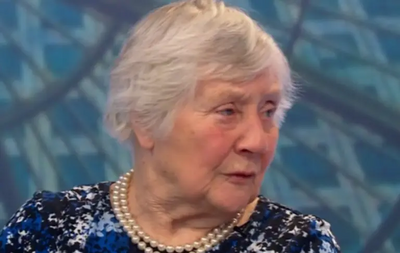Shirley Williams, on the EU Referendum

Baroness Shirley Williams gave a speech at the National Liberal Club last week, discussing the European Union and the upcoming referendum.
She began with an assessment of the press coverage and public debate so far: "I am very disappointed with this referendum -- I will make no bones about that at all. I think some of the key questions have not been raised, not been discussed and not been argued. It has become increasingly, and particularly in the last few days, a referendum about who should be the next leader of the Conservative party. That is not what the referendum subject is about. It is about the next forty years in Britain, and the next forty years in Europe, and the relationship between the two, and many of us realise that the next forty years will be decisively altered and changed by the outcome of this referendum. And you wouldn't really believe that if you followed the press very carefully - you would think it was essentially about a battle between two elderly white gentlemen against two other elderly white gentlemen who wrest succession in one single party in this country. I find that very depressing."
She went on to discuss what the referendum really is all about.
A worry is that people won't actually vote at all, given the extent to which the debate has focussed on issues solely within the Conservative party, so that the public don't realise the extent to which the subject is crucially relevant to them. We should be considering, for example, how the distribution of income and wealth is considerably fairer in other Western European countries than in the UK, and it is only the European Commissioner for Competition who is fighting tax evasion (amounting to hundreds of millions of pounds) by companies such as Amazon, Starbucks and Google -- international companies acting independently of national sovereignty, who can therefore be dealt with only by an international body. We no longer live in a world of nation states, and it is only through a consensual approach that we can get social justice.
Arguments from Leave campaigners tend to suggest that whatever is wrong with the UK (such as a cash-strapped NHS) are somehow the fault of the European Union. But without the 135,000 NHS staff who come from other countries, we would have no National Health Service. Furthermore, we spend just 8.9% of GDP on health, whereas France and Germany both spend 11% of their GDP and the US spends 16%, so we are very limited in the efficiencies that our health service can produce and it is unrealistic to suggest that the lack of funding, or our inability to tackle major health challenges, is related to the European Union.
In 2021, the last remaining nuclear warfare treaty (the New START Treaty, between Russia and the United States) will expire, and along with it any legal controls and limitations on nuclear weapons. Any replacement would require discussion between the US, Russia and the EU to prevent a further nuclear arms race. But Russia is placing tactical nuclear weapons on their border, North Korea is a nuclear threat, and cyber security is an increasing issue. We are entering an extremely dangerous time, which should be essential to the European Union debate.
The EU has a consistently good record of dealing with climate change, environment and pollution, which is vital to our well-being. Instead of talking entirely about economics, we ought to think more about these major issues. And when considering economics, we should think of the effect on households and families, and not on banks.
The EU has contained and managed the threat of war in Europe (sometimes with NATO), but wars in Europe are not dead. As recently as ten years ago, we faced a risk of war in the Balkans, but we don't talk about it and have put it from our minds. The EU has been a fundamental influence for peace and democracy, and for human rights.
Shirley ended by stressing that it is crucial to make sure that every young person votes, and that every Liberal Democrat, Labour, Green and broadly pro-Europe voter votes. "If we are defeated, we will be defeated by a mixture of apathy and by an extraordinary failure to concentrate on the really crucial issues. "I think we can win, and I think if we do win, we could be on the way to a better world; if we lose, we could be on the way to a world where you live in a fictional life of cottages with roses round the door, and long-ago memories of things that have long ago disappeared."
You can watch Shirley's speech in full in this video:
<iframe style="border: none; overflow: hidden;" src="https://www.facebook.com/plugins/video.php?href=https%3A%2F%2Fwww.facebook.com%2Flibdems%2Fvideos%2Fvb.5883973269%2F10154228425443270%2F%3Ftype%3D3&show_text=0&width=560" frameborder="0" scrolling="no" width="560" height="315"></iframe>